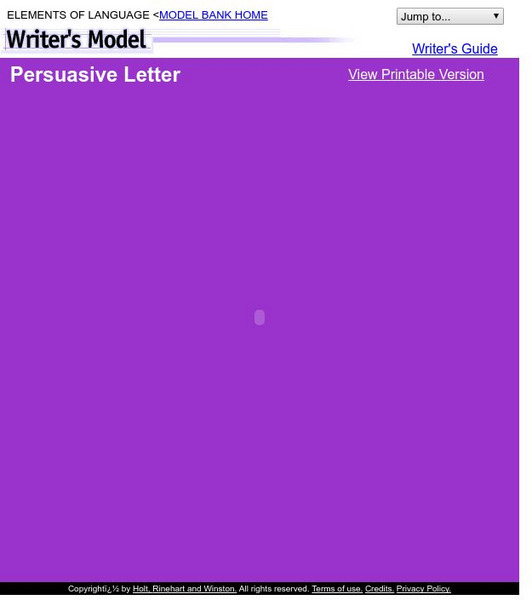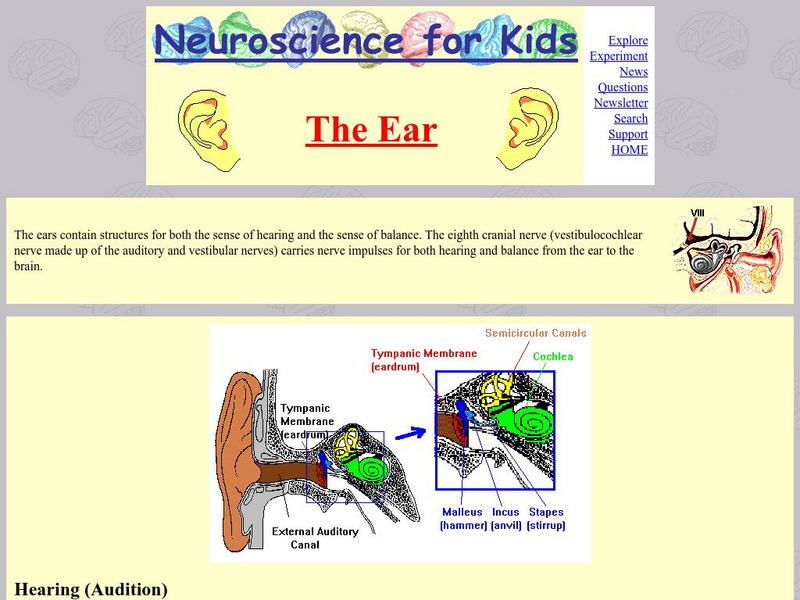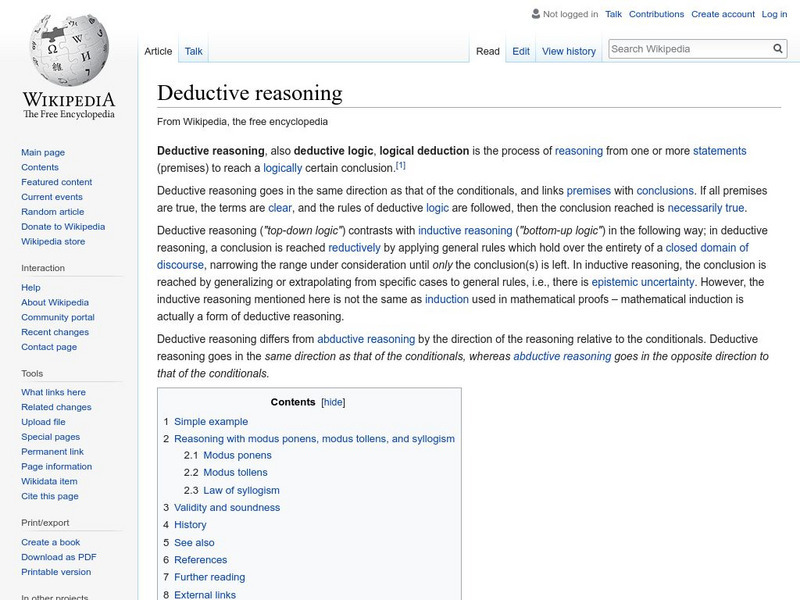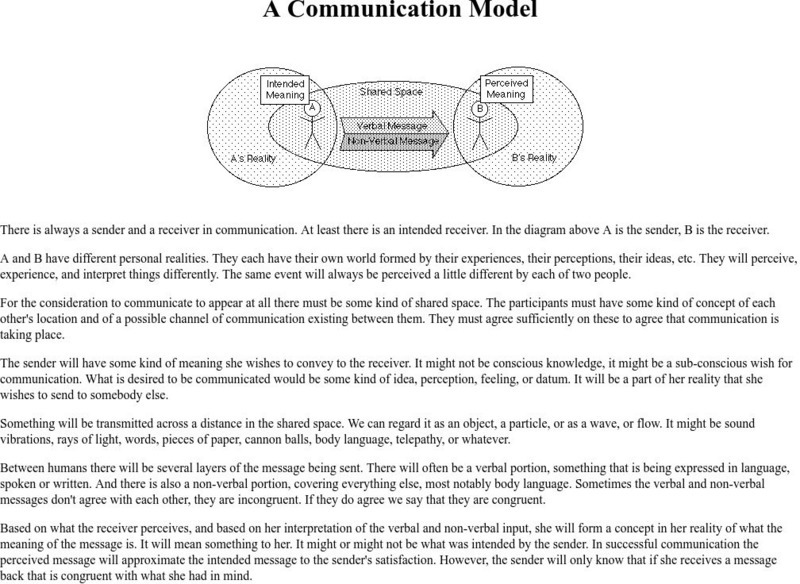Sophia Learning
Sophia: Critical Reading as a Learning Strategy
This tutorial focuses on critical reading using a downloadable PowerPoint presentation, "Critical Reading 101," which includes separating fact from opinion, 6 propaganda techniques, and 6 common fallacies in reasoning. Also provided is...
Polk Brothers Foundation Center for Urban Education at DePaul University
De Paul University: Center for Urban Education: Use Evidence to Show How a Writer Supports
This Center for Urban Education resource provides a downloadable graphic organizer for students to use when analyzing the evidence that authors use to support a claim. RI.9-10.5 ideas/claims developed. CCSS.ELA-Literacy.CCRA.R.8
Sophia Learning
Sophia: Argumentative Essays
This tutorial focuses on argumentative essays, longer writings on a well-researched topic with the writer arguing one side of the topic, free of fallacies, and providing several claims. A short YouTube clip of Monty Python shows the...
Houghton Mifflin Harcourt
Holt, Rinehart and Winston: Writer's Model: Persuasive Letter Example
This persuasive letter example is three pages long and includes points on the left hand column. Clicking on the "Writer's Guide" link in the upper right-hand corner of the page enables the user to get tips, directions, and explanations...
FNO Press
Fno.org: Inspired Investigations
An article at From Now On about how to help students do better research by changing the focus of research assignments and teaching students to ask essential questions. Some suggestions include using mind mapping, and using Inspiration to...
American Psychological Association
American Psychological Association: Facial Expressions
The American Psychological Association discusses whether facial expressions accurately reveal emotions and other details about the personality.
University of Oxford (UK)
Oxford University: Articulation Vowels and Consonants
This webpage article is a very technical discussion of articulation of speech sounds. Multiple technical linguistic terms are used throughout the essay.
University of Washington
University of Washington: The Ear
The University of Washington offers a description of how the ear works, plus plenty of fascinating facts. Includes labeled diagram of the ear, sound clips of vocabulary words, and links to pages for further investigation.
University of California
University of Cal: Critical Thinking in an Online World
This article discusses why and how to encourage the development of critical thinking skills for students conducting research on the Web. The author even presents an overview of a project that you could adapt to your class.
Wikimedia
Wikipedia: Deductive Reasoning
This free encyclopedia site from Wikipedia gives a definition and examples of deductive reasoning. It also has links to related terms and topics.
TED Talks
Ted: Ted Ed: How Interpreters Juggle Two Languages at Once
Language is complex, and when abstract or nuanced concepts get lost in translation, the consequences may be catastrophic. Given the complexities of language and cultural exchange, how do these epic miscommunications not happen all the...
TED Talks
Ted: Ted Ed: How Miscommunication Happens (And How to Avoid It)
Katherine Hampsten describes why miscommunication occurs so frequently, and how we can minimize frustration while expressing ourselves better. [4:32]
TED Talks
Ted: Ted Ed: Your Body Language Shapes Who You Are
Social psychologist Amy Cuddy shows how power posing- standing in a posture of confidence, even when we don't feel confident- can affect testosterone and cortisol levels in the brain, and might even have an impact on our chances for...
Curated OER
Mc Graw Hill: Part 2 Reading: Informational Text: Evaluate Arguments and Claims
This article will help you evaluate informational text to determine whether an author's argument is supported by evidence or not. Click on Model to see a model with explanations and then click on Practice.
Polk Brothers Foundation Center for Urban Education at DePaul University
Depaul University: Center for Urban Education: Improve an Argument [Pdf]
This resource provides a downloadable worksheet. Students will read a nonfiction article and then answer scaffolded questions that will help them determine the strength of evidence presented in the argument. Then students will provide...
Polk Brothers Foundation Center for Urban Education at DePaul University
Depaul University: Center for Urban Education: Contrast Points of View [Pdf]
A graphic organizer is provided for students to use as they analyze arguments. Students will find a guiding question to answer after they complete this graphic organizer.
Web Center for Social Research Methods
Research Methods Knowledge Base: Deduction and Induction
This site provides a good explanation of deductive and inductive thinking.
Harvard University
Harvard University: Games With Words: The Communication Game
A study in communication where participants follow comprehension and logic clues to determine which statements are true and false.
Other
Dean and Laura Vandruff: Conversational Terrorism
This humorous essay arms you against a host of "conversation terrorist" techniques. Learn to interpret phrases that are meant to keep you quiet, change the subject, or throw you off track in your conversation. SL.9-10.3 Eval...
Other
World Transformation: A Communication Model
The site uses stick figures and Venn diagrams to show how communication happens including verbal and nonverbal information. It also includes two exercises to perform.
Other
The Skeptic's Dictionary: Begging the Question
This site from The Skeptic's Dictionary defines the term and provides a number of examples. Each example is given a complete explanation.
Other
Data Guru: The Communication Process
This communication tutorial focuses on online communication in which interpretation can lead to conflict.
Other
Speaking Effectively: Supporting the Talk
This substantial section focuses on supporting the main points of your speech or presentation. Find out how to avoid faulty reasoning and irrational appeals.




















